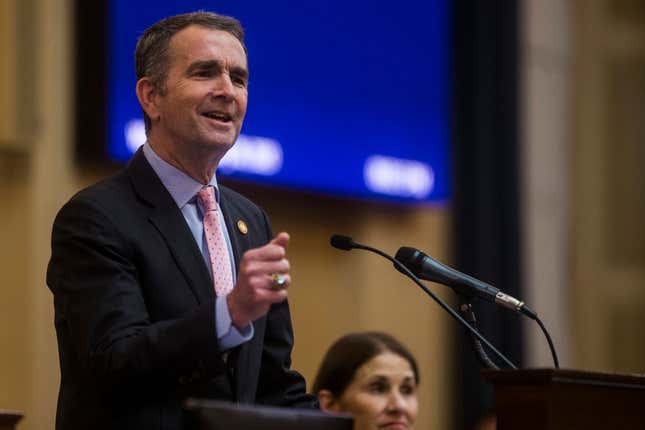
On Tuesday, Virginia Gov. Ralph Northam granted seven Black men, who were executed for the rape of a white woman in 1951, posthumous pardons after pleas for mercy from their families and as the case gained international attention as an example of how the death penalty was used almost exclusively for Black offenders.
According to the Associated Press, the pardons came after Northam met with some 12 descendants of the men and their advocates, who cried upon learning the news of Northam’s announcement.
The seven men, most in their late teens or early 20s, were:
- Francis DeSales Grayson
- Frank Hairston Jr.
- Howard Lee Hairston
- James Luther Hairston
- Joe Henry Hampton
- Booker Millner
- John Clabon Taylor
From AP:
The “Martinsville Seven,” as the men became known, were all convicted of raping 32-year-old Ruby Stroud Floyd, a white woman who had gone to a predominantly black neighborhood in Martinsville, Virginia, on Jan. 8, 1949, to collect money for clothes she had sold.
Four of the men were executed in Virginia’s electric chair on Feb. 2, 1951. Three days later, the remaining three were also electrocuted. All of them were tried by all-white juries. It was the largest group of people executed for a single-victim crime in Virginia’s history.
At the time, rape was a capital offense. But Northam said Tuesday that the death penalty for rape was applied almost exclusively to Black people. From 1908 — when Virginia began using the electric chair — to 1951, state records show that all 45 people executed for rape were Black, he said. The pardons do not address the guilt or innocence of the men, but Northam said the pardons are an acknowledgement that they did not receive due process and received a “racially-biased death sentence not similarly applied to white defendants.”
“These men were executed because they were Black, and that’s not right,” Northam said.
“Their punishment did not fit the crime. They should not have been executed,” he added.
Northam pointed to several issues he had with the case, including noting that several of the men were under the influence when they were arrested and couldn’t read the confession they signed. None of the men had attorneys with them when they were questioned and all of the men were “convicted and sentenced to death within eight days,” AP reports.
Protesters reportedly called for the White House and the governor’s office to grant the men mercy, to no avail.
“Thank you, Jesus. Thank you, Lord,” James Walter Grayson, the son of Francis DeSales Grayson, who was one of the seven, sobbed loudly when Northam told them he would be granting the men pardons.
“It means so much to me,” he said of the pardon.
James was 4 when his father was executed.
“I remember the very day the police came to the door. He kissed us and they took him away,” he told AP.
AP notes that in December, advocates and descendants of the Martinsville Seven began asking for pardons. And, while they didn’t argue for the men’s innocence, they did point out that trials offered the men were unfair and the punishment unjust.
“The Martinsville Seven were not given adequate due process ‘simply for being Black,’ they were sentenced to death for a crime that a white person would not have been executed for ‘simply for being Black,’ and they were killed, by the Commonwealth, ‘simply for being black,’” the advocates wrote in their letter to Northam.
“This is about righting wrongs,” Northam said. “We all deserve a criminal justice system that is fair, equal, and gets it right—no matter who you are or what you look like,” he said.

